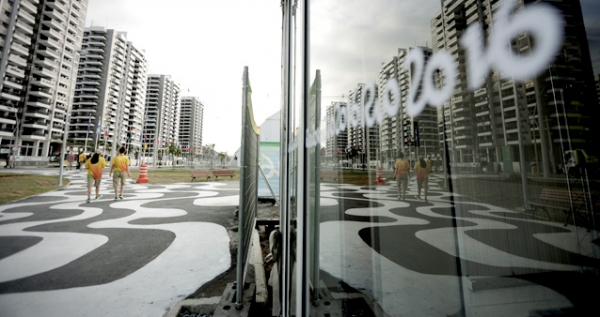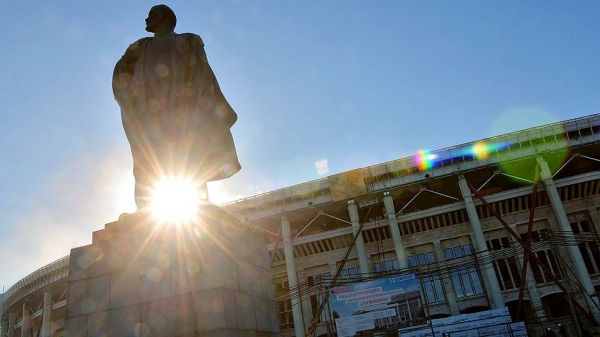What they wanted and what made Rio to meet the Olympic games

For several months not a day goes by without breaking news about the unwillingness of Brazil to host the Olympics in Rio de Janeiro. Hardly any nation is able to enjoy the mass celebrations as it can do the Brazilians, however, the current Game of sport and a unique chance to raise the country’s international ratings became a nightmare for residents, organisers and for the athletes themselves. Brazilians don’t like to plan ahead, they are extremely spontaneous, famous for the talent to solve problems as they arise and skillfully improvising under conditions of force majeure. The organizers of the Games rely on the renowned hospitality and joie de vivre of the Brazilians, however, the promise of catching fun today for Rio Olympic is not felt.
According to polls, two-thirds of the population oppose the Games. Even the fact that this year Brazil will present the greatest for all history of the country’s participation in the Games team — 462 athlete-Olympian, not able to change the overall bleak mood.
Brazilians are easy to understand. Olympics 2016 — a shame on an international scale for the Latin American giant and a lost opportunity to put in order charming of Rio de Janeiro, the stunning beauty of the city with a wonderful climate.
Rio has won the bid to host the first ever Olympics in South America in 2009 under the government of the charismatic Lula da Silva. In the 2000s, Brazil experienced an economic boom thanks to high prices for oil, steel and soybeans. The country has a 30 million strong middle class, and this phenomenon dubbed the “Brazilian miracle.”
Unfortunately, the Duo successive presidents Lula da Silva — Dilma Rousseff, which the local media often referred to as the tropical version of the Duo “Putin — Medvedev” was not able to take advantage of favorable factors for the industrialization and development of infrastructure and prefer to continue to lobby for their own interests, hiding behind the ideas of Marx and populist slogans about the legalization of abortion, marijuana, and other attributes of freedom, equality and brotherhood. At Lula with Dilma, in total, were alternately in power for almost 20 years, there was no plan B, in case of falling prices for resources and the ensuing catastrophic drop in investment, lending and consumption.
The Duo were involved in the largest in the history of the country a corruption scandal involving kickbacks, which are the main Brazilian companies used to pay top managers of state-owned oil giant Petrobras, and for a time was removed from the policy.
On April 21, during the ceremony of lighting the Olympic flame in Athens, Rio crashed into the sea, erected for the Games suspended Bicycle path Tim Maia laid along a picturesque coastline: land area length of 50 meters, fixed on the rocks at a height of 10 meters, did not survive the impact. Two people were killed, 12 were seriously injured. The mayor of Rio Eduardo PAES immediately flew from Greece to Brazil, vowing to punish those responsible. However, the public is not reassured. How could engineers not foresee basic effects of shock waves?
The reason for such tragedies lies in the so-called Mode of differentiated contracts (RDC), introduced in 2011, under the pretext of simplification of bureaucratic red tape in the construction of facilities for the world Cup 2014 and the Olympics in 2016. This clever mechanism gives the right construction companies to provide authorities only the most General project of objects without any specific estimates. Instead of having to precisely specify the timing, materials, concepts and, most important, the cost of construction, companies have enough raw pre-draft. Mode facilitates kickbacks and cost overruns, gives the go-ahead of corruption, squandering of public funds and outright trash. Therefore, the initial budget of the construction of the infamous cycle paths in June amounted to 35 million reais (10 million dollars). At the time of completion cost of the project amounted to 45 million reais, 30% higher than the initial estimate.
Thanks to the Olympics and the world Cup 2014 in Brazil, a whole generation of engineers, architects, and urbanists who in life have not made any full-fledged construction project with real deadlines and estimates, and the cities of the Latin American giant gaping broken pointless objects.
In Rio everyone knows that the construction company Concremat, who built the bike path belongs to the relatives of the government’s Secretary for tourism, Antonio Pedro Figueira de Mello. The value of contracts sold grew 18 times since then, like Eduardo PAES became mayor of Rio. Between 2000 and 2008, the company signed 15 contracts for a total amount of 24 million reais ($6.5 million). After the election of PAES Concremat overnight signed 54 contracts for the construction of an absolute majority of the Olympic facilities with a total value of 451,6 million reais.
Lula’s government, having the right to hold the Olympics, immediately started talking about an ambitious environmental project — cleaning the Guanabara Bay in Rio, where for many years drained waste and other effluents. There it was decided to hold the Olympic competitions in water sports. Around the Bay has about 8.5 million people, most of them in slums without Sewerage system. The megaproject involves the construction of a wastewater treatment plant and the clearance of the Bay from tons of waste, primarily scrap metal and plastic. Budget money for sewage treatment plants vanished overnight. Then the project began to allocate funds to various environmental foundations and governments of many countries, from Canada to Japan. Now no one can say where these settled amount of space. A year ago the government purchased several ships, which gave the absurd name of “Ecolodge”. For just one ship capable of transporting 300 kilograms of garbage, and, by and large, to clean the Bay they are useless.
A few days before the competition in the fetid waters of Guanabara peacefully swaying refrigerators, sofas, dead animals. Lars Grael, Olympic medalist in Seoul and Atlanta, in an interview with Brazilian TV said it will be “sailing competitions with obstacles”, and that, likely, in the midst of a regatta all this debris will begin to stick to the hulls of vessels.
Another miserably failed Olympic mega-project — the so-called “PacifiCare” (peace) in urban slums. The crime rate this year jumped by 30% in comparison with the past, today the Rio live in a state of civil war. On the freeway, connecting the city with an international airport and frequent skirmishes between gangs of drug lords, forcing motorists to stop and lie down on the asphalt. The surgeons of the hospital Jorge Lorenzo, located near the Olympic village, in an interview with BBC told that, although none of the employees at the hospital, doctors are not trained military medic, any of them has enough experience for operations in combat. Recently, the hospital came to train doctors from Israel. Brazilian doctors have every day operate of the participants and victims of wars of the lords. There are cases of threats from enemies of patients, last month, the hospital building has been cordoned off by heavily armed members of the gang threatened staff with grenades, demanding immediate issuance of the injured patient.
In mid-July in Rio, was declared a state of emergency of the economic situation. Since the beginning of the year, delay the salaries of public servants, doctors and police. The organizers of the Games had high hopes for the human factor, hoping that Brazilians will infect you with their zest for life guests. However, at the airport, tourists and athletes meet the striking police and firefighters with banners of “Welcome to hell. We do not pay salaries, so we can’t provide security at the Olympics.”
Experts believe that the main problem of Brazil is the attitude of the population, which not only forgives the corrupt politicians, but vote for those who turn a blind eye to the flourishing of bribery on lower levels. Brazilians and Russians are surprisingly easy to tolerate corruption. It is hoped that after the shame with the Olympics in 2016 this will change for the better.








